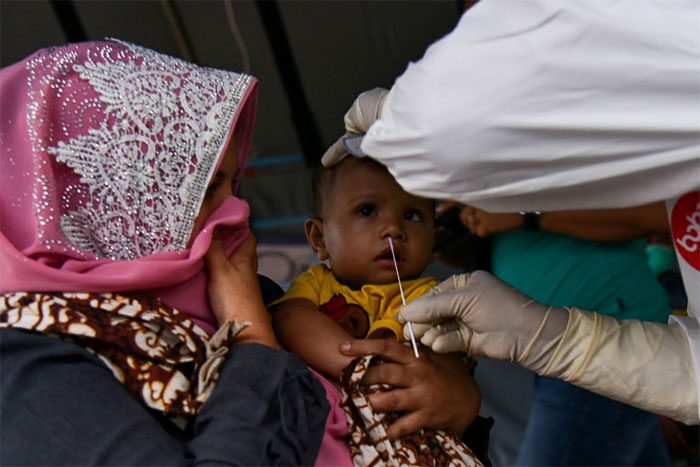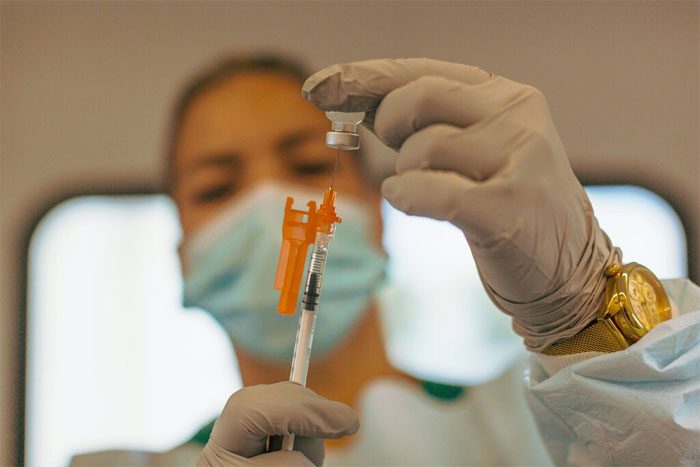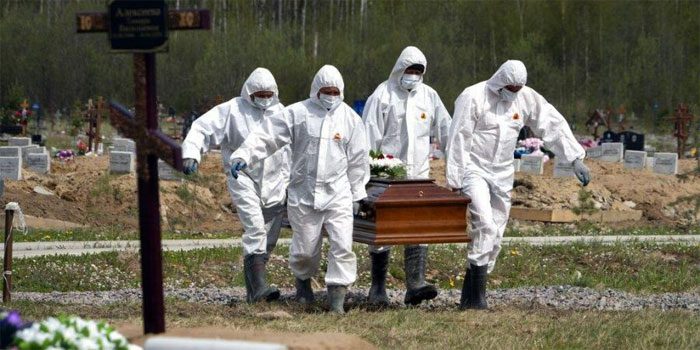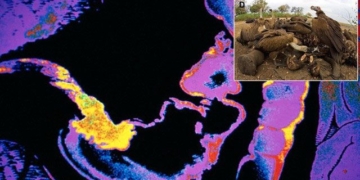Scientists believe that Covid-19 is different from previous pandemics and will not be over in the next six months, but will require more time.
In the context of many countries quickly implementing and achieving success with vaccination programs, many people hope to “see the light at the end of the Covid-19 tunnel” in the next 3-6 months.
However, scientists argue: “Try to endure this situation a little longer, as Covid-19 will not end in the next six months.”

Experts believe that Covid-19 will not end in the next six months. (Photo: Reuters).
New outbreaks may lead to schools being closed. Workers may not return to the office while hospitals are overwhelmed. And nursing homes remain high-risk areas, regardless of whether the elderly there have received two vaccine doses or not.
Experts suggest that before the pandemic ends, almost everyone will either contract Covid-19, be vaccinated, or possibly both, according to Bloomberg.
Covid-19 is like a Wildfire
Some unfortunate individuals may contract Covid-19 twice or more. New waves of infection could produce new variants, and the global fight against Covid-19 will not end until the SARS-CoV-2 virus has affected everyone.
Michael Osterholm, director of the Center for Infectious Disease Research and Policy at the University of Minnesota in Minneapolis, and an advisor to U.S. President Joe Biden, stated: “In my opinion, these outbreaks will continue to occur worldwide. After that, they will gradually decline, possibly to a low level. And then, there may be another outbreak in the fall and winter.”
With billions of people still unvaccinated around the world, new hotspots may emerge in schools, public transport, and workplaces in the coming months as economies reopen.
Even as vaccination rates increase, certain groups—such as infants and those who cannot or are not vaccinated—remain at high risk of illness. Additionally, breakthrough infections can still occur in vaccinated individuals.
According to Bloomberg, the next few months will be a challenging period. The most serious threat is if SARS-CoV-2 produces variants resistant to current vaccines.
“The road ahead will be full of hills and obstacles, at least for the next few years until we have more vaccines. Vaccines will help. But the challenge is how bumpy those hills will be? We don’t know. But we can only say that this is a wildfire caused by SARS-CoV-2, and it will not stop until all the wood in the ‘human forest’ is burned,” Osterholm said.

Vaccines are considered an effective measure to combat Covid-19. (Photo: New York Times).
How is Covid-19 Different from Previous Pandemics?
According to Lone Simonsen, an epidemiologist and professor of population health science at Roskilde University in Denmark, the world has recorded five flu pandemics over the past 130 years. This data can help analyze and predict Covid-19.
Among the five flu pandemics, the longest lasted five years. The other pandemics included 2-4 waves of infection over an average period of 2 or 3 years.
Covid-19 is identified as a more serious pandemic, as the world has entered its second year with a third wave of the disease and still shows no signs of ending.
SARS-CoV-2 may not follow the same path as past pandemics. It is a different, novel pathogen with a higher transmission potential. With a death toll exceeding 4.6 million so far, the number of deaths from Covid-19 has been double that of any outbreak since the Spanish flu in 1918.
Countries with low vaccination rates such as Malaysia, Mexico, Iran, and Australia are experiencing the largest outbreaks since the pandemic began due to the rapid spread of the Delta variant. With the situation spiraling out of control, another variant is likely to emerge.
According to epidemiologist Simonsen, it is a mistake to believe that the virus will gradually reduce its activity to avoid completely wiping out its host population. Although new mutations are not always more dangerous than previous ones, “in fact, pandemics can be more deadly while the virus adapts to its new host.”
In the early stages of Covid-19, the world had good reason to hope that vaccines could provide long-term protection for humans, similar to vaccines for other diseases, such as polio.
SARS-CoV-2 has a “proofreading” mechanism to correct errors during viral replication, reducing the likelihood of mutations occurring when the virus is transmitted from one person to another.

The Delta variant is complicating the Covid-19 pandemic. (Photo: Reuters).
However, the number of Covid-19 cases globally has been so large that breakthrough cases are still emerging.
Kanta Subbarao, director of the Influenza Research Center at the Peter Doherty Institute for Infection and Immunity in Melbourne, Australia, stated: “With this pandemic, we are facing an enormous number of infections. This disrupts the virus’s proofreading ability.”
Therefore, Covid-19 may resemble influenza, requiring frequent booster vaccinations to maintain protection as the virus evolves.
What is the Conclusion?
So far, experts agree that it is clear the pandemic will not end in the next six months. Overall, they agree that the current outbreak will be controlled when the majority of the global population, about 90-95%, has immunity through vaccination or natural immunity after recovering from the disease.
Experts emphasize that vaccination is a crucial factor.
“If you are not vaccinated, you will be like an easy target, as the virus will spread and reach almost everyone this fall and winter,” Professor Simonsen noted.
More than 5.66 billion vaccine doses have been administered worldwide, according to Bloomberg. However, the success of vaccination programs in some regions, such as the European Union, North America, and China, overshadows failures in other areas. Most countries in Africa have only fully vaccinated about 5% of their populations. India has also only fully vaccinated about 26% of its population.
Erica Charters, an associate professor of the history of medicine at the University of Oxford, believes that the Covid-19 pandemic will end at different times in different places, similar to previous outbreaks. Governments will have to decide how much they can coexist with the disease.


















































